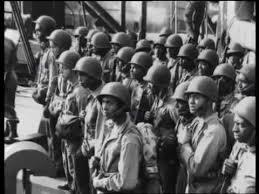My father served in the United States Army during the Second World War. Stationed in north Africa and Asia, my father would tell we kids about his tour of duty. However, my father never told we kids about the horrors of war, and we kids knew that it was best not to ask.
Those first six years he was close-mouthed?
~

My grandfather served on the US Army during World War II (I believe he was drafted, but I’m not sure). I don’t remember hearing him speak about it when I was a minor, he never lived in my hometown back then, and I only remember seeing him four or five times throughout the entire time I was growing up when we took vacations to visit with him.
I do, however, vividly remember when I was in my early twenties and serving in the US Marines, I was stationed on the East Coast, but I was back home on leave, and he had moved there to my hometown. I believe he would have been in his late sixties or early seventies then. I took him to a nice fancy restaurant so that he and I could spend time together, and I was always very interested in his stories about his life. Being alone one-on-one was a great opportunity to listen to him uninterrupted by other distractions.
It all started out really well. He was a Baptist minister from a young age, so when he was in the Army, the other men in his unit nicknamed him “Preacher”. He told me he had some medical reason that prevented him from being sent overseas, so he had never gone to combat. I asked which unit he was in and where he was stationed, his memory was failing, so he couldn’t remember all those details.
Once, his unit was transferred temporarily to somewhere near the US/Mexico border for a training exercise. It was the first time in his life he had contact with people of Mexico, he remarked on two things that stood out to him: when they went to the town outside the base, he thought some of the Mexican women were the prettiest women he had ever seen in his entire life before or since, but that he couldn’t understand one word of Spanish. “They speak that Spanish, you know,” was how he said it. Growing up in the rural south in the 1920s, all he knew of life firsthand was other Black people like himself and whites and some scattered Native Americans here and there.
He didn’t know how long his unit stayed at that training location nor when they returned to his permanent post.
He told me other stories, it was all very enjoyable. Until “it” happened. My grandfather’s hearing was really bad, so he talked very VERY loudly. It was no problem, the restaurant was crowded, a lot of people were talking, so he wasn’t bothering anyone, it was no big deal. Then, all of a sudden, he remembered something that he HAD to tell me.
“You know we did have one China boy in my unit,” he said loudly. I almost spewed mashed potatoes and gravy all over the place.
“Yep, my first time ever seein’ one of them, a real live China boy!” I was going through cardiac arrest, looking around to see if people had heard him, but he wasn’t done yet, not by a long shot.
“I couldn’t believe it, a China boy, right there in front of my own eyes. I had never seen one before.”
I tried to quiet him down, “Granddaddy, you know that these days, nobody says that any more. It’s best to say Asian.” I told him discreetly, hoping he’d take the hint.
“Really?” He seemed genuinely surprised. “Well, back then, that‘s what everybody called ‘em: CHINA BOYS.” Every time he said it, it seemed to get louder. “We didn’t have any Jew boys or Polish boys, but being a segregated unit, it was just us Colored boys. I guess they didn’t have a whole lot of CHINA BOYS, enough to make a whole unit, so they just threw this CHINA BOY in with us. He was my first CHINA BOY. Nice fella, I can’t remember his name now though. My first CHINA BOY.”
By then, all the color had drained from my face and I was trying to hide under the table cloth. I quickly changed the subject as far away from anything touching the possibility that he’d repeat it again. He was and old man innocently locked in his time period and saw absolutely nothing wrong with what he thought was acceptable conversation, I was glad that I was able to sway him to other topics. I couldn’t even look at the people at the tables around us, I quickly asked for the check and skeedaddled him out of there.
~
(short barrow short-barrel)
(long barrow long-barrel)